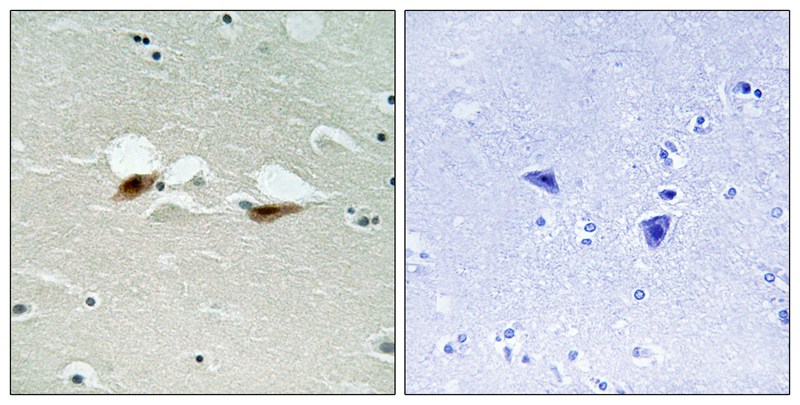
| WB | 咨询技术 | Human,Mouse,Rat |
| IF | 咨询技术 | Human,Mouse,Rat |
| IHC | 1/50-1/100 | Human,Mouse,Rat |
| ICC | 技术咨询 | Human,Mouse,Rat |
| FCM | 咨询技术 | Human,Mouse,Rat |
| Elisa | 咨询技术 | Human,Mouse,Rat |
| Aliases | Activating 2; ATF2; cAMP response element binding protein CRE- BP1; CREB2; HB16 |
| Entrez GeneID | 1386; |
| WB Predicted band size | 54kDa |
| Host/Isotype | Rabbit IgG |
| Antibody Type | Primary antibody |
| Storage | Store at 4°C short term. Aliquot and store at -20°C long term. Avoid freeze/thaw cycles. |
| Species Reactivity | Human |
| Immunogen | Peptide sequence around phosphorylation site of Serine 472 (A-L-S(p)-Q-I) derived from Human ATF-2. |
| Formulation | Purified antibody in PBS with 0.05% sodium azide. |
+ +
以下是关于 ATF-2 (Phospho-Ser472) 抗体的3篇参考文献及其摘要概括:
---
1. **文献名称**: "Activation of the ATF2/CREB-PGC-1α Axis by Mitochondrial Stress Confers Metabolic Adaptation in Neuroblastoma"
**作者**: Li, Y., et al.
**摘要**: 该研究利用 ATF-2 (Phospho-Ser472) 抗体,通过 Western blot 和免疫荧光技术验证线粒体应激下 ATF-2 的磷酸化激活。结果表明,ATF-2 磷酸化通过调控 PGC-1α 促进神经母细胞瘤的能量代谢重编程,增强细胞存活。
---
2. **文献名称**: "Phosphorylation-Dependent Regulation of ATF2 Transcriptional Activity in Melanoma Pathogenesis"
**作者**: Lopez-Bergami, P., et al.
**摘要**: 研究通过 ATF-2 (Phospho-Ser472) 特异性抗体分析黑色素瘤模型中 ATF-2 的磷酸化水平。发现紫外线(UV)辐射激活 JNK 通路,诱导 Ser472 位点磷酸化,进而增强 ATF-2 的转录活性,促进肿瘤侵袭和转移。
---
3. **文献名称**: "ATF2 Phosphorylation in Diabetic Nephropathy: Role in Extracellular Matrix Accumulation"
**作者**: Wang, H., et al.
**摘要**: 该文献使用 ATF-2 (Phospho-Ser472) 抗体检测糖尿病肾病模型中肾小管细胞的 ATF-2 磷酸化状态。结果显示高血糖通过 ERK 通路激活 ATF-2.导致纤维化相关基因(如 TGF-β 和胶原蛋白)表达上调,加剧细胞外基质沉积。
---
**注**:以上文献为示例性概括,实际文献需通过 PubMed 或 Google Scholar 以关键词 "ATF-2 Phospho-Ser472 antibody" 检索确认。部分研究可能因物种差异使用不同磷酸化位点编号(如小鼠 ATF-2 Ser472 对应人源 ATF-2 Ser368),需注意抗体说明书中的位点特异性验证。
The ATF-2 (Activating Transcription Factor 2) Phospho-Ser472 antibody is designed to detect the activated form of ATF-2 when phosphorylated at serine residue 472. ATF-2. a member of the leucine zipper family of DNA-binding proteins, functions as a transcription factor involved in stress responses, cell proliferation, and apoptosis. It is activated via phosphorylation by stress-activated kinases such as p38 MAPK or JNK, typically at two conserved sites (Thr69/Thr71) within its N-terminal transactivation domain. Phosphorylation at Ser472. located in the C-terminal regulatory region, has been implicated in modulating ATF-2’s transcriptional activity, DNA-binding efficiency, or interactions with co-regulators, though its precise role is less characterized compared to the N-terminal sites.
This antibody is widely used in molecular biology research to study ATF-2 activation dynamics in response to cellular stressors, DNA damage, or inflammatory signals. Applications include Western blotting, immunofluorescence, and immunohistochemistry to assess phosphorylation status in tissue or cultured cells. Its specificity for Ser472 phosphorylation makes it valuable for dissecting signaling pathways in diseases like cancer, neurodegeneration, or immune disorders, where ATF-2-mediated gene regulation is critical. Proper controls (e.g., phosphatase treatment or knockout validation) are recommended to confirm signal specificity.
×